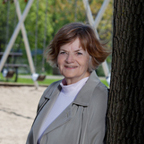e-Dialogue
Monday, November 28th from 10:00 am - 11:30 am PST / 1:00 pm - 2:30 pm EST on Changing the Conversation
This conversation brings together the MC3 2.0 research team to discuss the second phase of the project. The first phase, MC3: Meeting the Climate Change Challenge, studied 11 local government climate innovators in British Columbia. As part of the second phase, we re-interviewed a sub sample of the original first phase interviewees in order to track if any changes had occurred in their development paths. Our team will discuss the revised coding framework, decomposition analysis, and indicator framework that are helping to guide our analysis. We will also share our ongoing process of visualizing the data and how text mining is informing our approach.
Check out our first from a series of data visualizations illustrating our findings. This is the fun part: asking questions of the data. What is the number one topic across all the local governments? Which local governments are most closely linked in their vocabulary? What are the topics hardly anyone is talking about? How do the topics change from year to year?
Click here here to read the conversation
PANELISTS
 |
Professor Ann Dale, Moderator, held a Canada Research Chair in Sustainable Community Development (2004-2014) at Royal Roads University, School of Environment and Sustainability. A former Trudeau Fellow Alumna (2004), she is a Fellow of the World Academy of Arts and Science, chairs the Canadian Consortium for Sustainable Development Research (CCSDR), a Board Member of the World Fisheries Trust and the founder of the National Environmental Treasure (the NET). Current research interests include governance, social capital and agency, biodiversity conservation, place-based and virtual sustainable communities. She is a recipient of the 2001 Policy Research Initiative Award for Outstanding Contribution to Public Policy for her book, At the edge: sustainable development in the 21st century. Professor Dale is actively experimenting with research dissemination and social media. |
| Alastair Moore's research interests involve the role that normative discourses, imageries and materialities play in maintaining or destabilizing existing practices—good and bad. His PhD examines the agency and daily practices of intermediaries within the housing energy retrofit system, and how the former influence/direct the latter. Underpinning his academic pursuits lies a range of more applied sustainability experiences which co-constitute a supporting framework for his current theoretical investigations. He has developed energy and emissions policy at the local government level, assisted cities in transitioning countries to create more enabling institutional arrangements, and launched Canada's first all-green building supply retail/wholesale business. While he considers this all useful, he believes his past endeavours will all benefit from re-framing the problem to account for those largely unseen push-pull interactions between social structures and the agent. |
 |
 |
Rob Newell completed an undergraduate in Biology and Statistics (University of Victoria), but developed a keen interest in the communication of environmental trends and sustainability ideas while working in the design, development, and delivery of environmental education programs and completing a graduate thesis on approaches to effective environmental communications (MA in Environment and Management, Royal Roads University). Rob is committed to exploring and discovering new methods of communicating sustainability to broad and diverse audiences, and his work has included developing environmental education programs for settlement agencies and project leading in Asia, Africa, and the South Pacific. Rob leads the social media program (HEADTalks) and data visualization work of the team, and is currently a doctoral candidate at the University of Victoria. |
| Dr. John Robinson is a Professor at the Munk School of Global Affairs, and the School of the Environment, at the University of Toronto; an Honorary Professor with the Institute for Resources, Environment & Sustainability at The University of British Columbia; and an Adjunct Professor with the Copenhagen Business School, where he is leading the sustainability component of their campus redevelopment process. Professor Robinson’s research focuses on the intersection of climate change mitigation, adaptation and sustainability; the use of visualization, modeling, and citizen engagement to explore sustainable futures; sustainable buildings and urban design; creating partnerships for sustainability with non-academic partners; and, generally, the intersection of sustainability, social and technological change, behaviour change, and community engagement processes. |
 |
 |
Shoshana Schwebel works as a Research Designer for Professor Ann Dale in the Department of Environment & Sustainability at Royal Roads University. She has been working in the new field of Digital Humanities for several years, applying computation methods and tools to the social sciences and humanities. As a member of Ann Dale’s research team, Shoshana works on data visualizations and analysis, animated videos, web design, and blogging. She received her MA and BA (Hons) from McGill, and is on hiatus from her PhD (UBC). |
| Dr. Alison Shaw, Principal at FlipSide Sustainability, is a sustainability consultant and organizational coach. With over twenty years of climate change and sustainability research and consulting experience, she is particularly interested in how to make the co-benefits of climate change and sustainability action make sense for local governments, higher education institutions and the private sector. Through FlipSide Sustainability, she uses pioneering approaches that move co-benefit knowledge to action: building healthy and sustainable organizations that care for both people and the planet, while also catalyzing the new era of business consciousness. |
 |
 |
Chris Strashok holds a bachelor’s degree in Chemical Engineering from the University of Calgary and a master’s degree in Environment and Management from Royal Roads University. He is a CRC research associate and an associate Royal Roads University faculty member, teaching the Systems Methods for Environmental Management in the Masters for Environment and Management program. He has a background in computer modeling and simulation, sustainable community development, chemical engineering, and systems theory. He has put his modelling experience to practice when working with whatIf? Technologies developing computer-based simulation models for long-term strategic planning and scenario analysis. |









